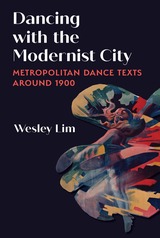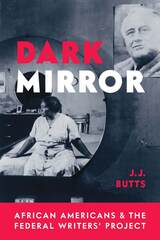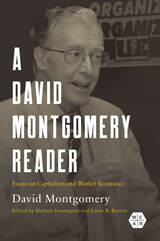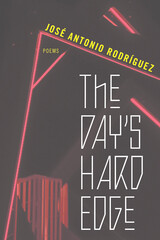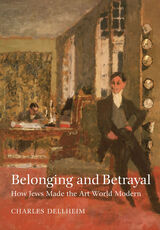
Since the late-1990s, the fate of Nazi stolen art has become a cause célèbre. In Belonging and Betrayal, Charles Dellheim turns this story on its head by revealing how certain Jewish outsiders came to acquire so many old and modern masterpieces in the first place – and what this reveals about Jews, art, and modernity. This book tells the epic story of the fortunes and misfortunes of a small number of eminent art dealers and collectors who, against the odds, played a pivotal role in the migration of works of art from Europe to the United States and in the triumph of modern art. Beautifully written and compellingly told, this story takes place on both sides of the Atlantic from the late nineteenth century to the present. It is set against the backdrop of critical transformations, among them the gradual opening of European high culture, the ambiguities of Jewish acculturation, the massive sell-off of aristocratic family art collections, the emergence of different schools of modern art, the cultural impact of World War I, and the Nazi war against the Jews.

political writer, and the standard-bearer of honesty and decency for the honourable 'Left'. In this controversial polemic, Scott Lucas argues that the exaltation of Orwell, far from upholding dissent against the State, has sought to quash such opposition. Indeed, Orwell has become the icon of those who, in the pose of the contrarian, try to silence public opposition to US and U K foreign policy in the 'War on Terror'.
Lucas's lively and readable critique of public intellectuals including Christopher Hitchens, Michael Walzer, David Aaronovitch, and Johann Hari – who have all invoked Orwellian honesty and decency to shut down dissent – will appeal to anyone disillusioned with the wars in Afghanistan and Iraq.
Lucas contends that these leading journalists and commentators have used Orwell to justify their own political transition from radicals to upholders of the establishment. All of them play influential roles in supporting the UK and US governments' charge that opponents of war -- and those who question the motives behind American foreign policy and its implementation -- should be condemned as 'appeasers of mass murder'.
This controversial book shows how Orwell has been used since 9/11 to justify, in the guise of independent thought, the suppression of dissent. We must rescue ourselves from Orwell and from those who take on his guise so, as Lucas puts it, our ‘silencing is… vital to a "manufacture of consent" for the wars which are supposedly being fought in our name and for our good’.

Emma Anderson uses one man's compelling story to explore the collision of Christianity with traditional Native religion in colonial North America.
Pierre-Anthoine Pastedechouan was born into a nomadic indigenous community of Innu living along the St. Lawrence River in present-day Quebec. At age eleven, he was sent to France by Catholic missionaries to be educated for five years, and then brought back to help Christianize his people.
Pastedechouan's youthful encounter with French Catholicism engendered in him a fatal religious ambivalence. Robbed of both his traditional religious identity and critical survival skills, he had difficulty winning the acceptance of his community upon his return. At the same time, his attempts to prove himself to his people led the Jesuits to regard him with increasing suspicion. Suspended between two worlds, Pastedechouan ultimately became estranged--with tragic results--from both his native community and his missionary mentors.
An engaging narrative of cultural negotiation and religious coercion, Betrayal of Faith documents the multiple betrayals of identity and culture caused by one young man's experiences with an inflexible French Catholicism. Pastedechouan's story illuminates key struggles to retain and impose religious identity on both sides of the seventeenth-century Atlantic, even as it has a startling relevance to the contemporary encounter between native and non-native peoples.
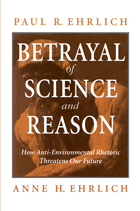
Despite widespread public support for environmental protection, a backlash against environmental policies is developing. Fueled by outright distortions of fact and disregard for the methodology of science, this backlash appears as an outpouring of seemingly authoritative opinions by so-called experts in books, articles, and appearances on television and radio that greatly distort what is or is not known by environmental scientists. Through relentless repetition, the flood of anti-environmental sentiment has acquired an unfortunate aura of credibility, and is now threatening to undermine thirty years of progress in defining, understanding, and seeking solutions to global environmental problems.
In this hard-hitting and timely book, world-renowned scientists and writers Paul R. Ehrlich and Anne H. Ehrlich speak out against what they call the "brownlash." Brownlash rhetoric, created by public relations spokespersons and a few dissident scientists, is a deliberate misstatement of scientific findings designed to support an anti-environmental world view and political agenda. As such, it is deeply disturbing to environmental scientists across the country. The agenda of brownlash proponents is rarely revealed, and the confusion and distraction its rhetoric creates among policymakers and the public prolong an already difficult search for realistic and equitable solutions to global environmental problems.
In Betrayal of Science and Reason, the Ehrlichs explain clearly and with scientific objectivity the empirical findings behind environmental issues including population growth, desertification, food production, global warming, ozone depletion, acid rain, and biodiversity loss. They systematically debunk revisionist "truths" such as:
- population growth does not cause environmental damage, and may even be beneficial
- humanity is on the verge of abolishing hunger; food scarcity is a local or regional problem and is not indicative of overpopulation
- there is no extinction crisis
- natural resources are superabundant, if not infinite
- global warming and acid rain are not serious threats to humanity
- stratospheric ozone depletion is a hoax
- risks posed by toxic substances are vastly exaggerated
Betrayal of Science and Reason is an eye-opening look at current environmental problems and the fundamental importance of the scientific process in solving them. It presents unique insight into the sources and implications of anti-environmental rhetoric, and provides readers with a valuable means of understanding and refuting the feel-good fables that constitute the brownlash.
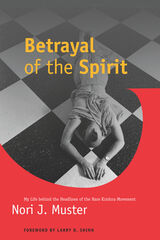
Combining behind-the-scenes coverage of an often besieged religious group with a personal account of one woman's struggle to find meaning in it, Betrayal of the Spirit takes readers to the center of life in the Hare Krishna movement.
Nori J. Muster joined the International Society of Krishna Consciousness (ISKCON)--the Hare Krishnas--in 1978, shortly after the death of the movement's spiritual master, and worked for ten years as a public relations secretary and editor of the organization's newspaper, the ISKCON World Review. In this candid and critical account, Muster follows the inner workings of the movement and the Hare Krishnas' progressive decline.
Combining personal reminiscences, published articles, and internal documents, Betrayal of the Spirit details the scandals that beset the Krishnas--drug dealing, weapons stockpiling, deceptive fundraising, child abuse, and murder within ISKCON–as well as the dynamics of schisms that forced some 95 percent of the group's original members to leave. In the midst of this institutional disarray, Muster continued her personal search for truth and religious meaning as an ISKCON member until, disillusioned at last with the movement's internal divisions, she quit her job and left the organization.
In a new preface to the paperback edition, Muster discusses the personal circumstances that led her to ISKCON and kept her there as the movement's image worsened. She also talks about "the darkest secret"–child abuse in the ISKCON parochial schools--that was covered up by the public relations office where she worked.
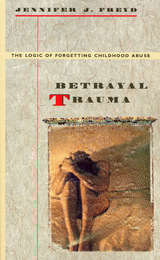

While most attempts to study betrayal only consider its moral or psychological dimensions, Gabriella Turnaturi here examines betrayal as an act embedded in social relationships whose meanings change over time. For example, adultery is one of the most recognizable forms of betrayal, but a wide gulf exists between its role in Madame Bovary and in The Ice Storm. Therefore, Turnaturi contends, in order to examine the many meanings of betrayal we need to understand its context in a specific time and place. Born from the unpredictable possibilities of human interaction, betrayal emerges as a sociological event in this thought-provoking meditation on the stab in the back.
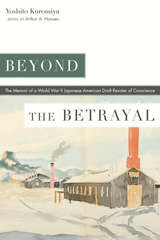
Of the 300 Japanese Americans who resisted the military draft on the grounds that the US government had deprived them of their fundamental rights as US citizens, Kuromiya alone has produced an autobiographical volume that explores the short- and long-term causes and consequences of this fateful wartime decision. In his exquisitely written and powerfully documented testament he speaks truth to power, making evident why he is eminently qualified to convey the plight of the Nisei draft resisters. He perceptively reframes the wartime and postwar experiences of the larger Japanese American community, commonly said to have suffered in the spirit of shikata ga nai—enduring that which cannot be changed—and emerged with dignity.
Beyond the Betrayal makes abundantly clear that the unjustly imprisoned Nisei could and did exercise their patriotism even when they refused to serve in the military in the name of civil liberties and social justice. Kuromiya’s account, initially privately circulated only to family and friends, is an invaluable and insightful addition to the Nikkei historical record.
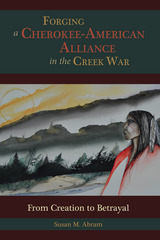
The Creek War of 1813–1814 is studied primarily as an event that impacted its two main antagonists, the defending Creeks in what is now the State of Alabama and the expanding young American republic. Scant attention has been paid to how the United States’ Cherokee allies contributed to the war and how the war transformed their society. In Forging a Cherokee-American Alliance in the Creek War, Susan M. Abram explains in engrossing detail the pivotal changes within Cherokee society triggered by the war that ultimately ended with the Cherokees’ forced removal by the United States in 1838.
The Creek War (also known as the Red Stick War) is generally seen as a local manifestation of the global War of 1812 and a bright footnote of military glory in the dazzling rise of Andrew Jackson. Jackson’s victory, which seems destined only in historic hindsight, was greatly aided by Cherokee fighters. Yet history has both marginalized Cherokee contributions to that conflict and overlooked the fascinating ways Cherokee society changed as it strove to accommodate, rationalize, and benefit from an alliance with the expanding American republic. Through the prism of the Creek War and evolving definitions of masculinity and community within Cherokee society, Abram delineates as has never been done before the critical transitional decades prior to the Trail of Tears.
Deeply insightful, Abram illuminates the ad hoc process of cultural, political, and sometimes spiritual transitions that took place among the Cherokees. Before the onset of hostilities, the Cherokees already faced numerous threats and divisive internal frictions. Abram concisely records the Cherokee strategies for meeting these challenges, describing how, for example, they accepted a centralized National Council and replaced the tradition of conflict-resolution through blood law with a network of “lighthorse regulators.” And while many aspects of masculine war culture remained, it too was filtered and reinterpreted through contact with the legalistic and structured American military.
Rigorously documented and persuasively argued, Abram’s award-winning Forging a Cherokee-American Alliance in the Creek War fills a critical gap in the history of the early American republic, the War of 1812, the Cherokee people, and the South.

Hanoi Jane, the book, deconstructs Hanoi Jane, the myth, to locate its origins in the need of Americans to explain defeat in Vietnam through fantasies of home-front betrayal and the emasculation of the national will-to-war. Lembcke shows that the expression "Hanoi Jane" did not reach the eyes and ears of most Americans until five or six years after the end of the war in Vietnam. By then, anxieties about America's declining global status and deteriorating economy were fueling a populist reaction that pointed to the loss of the war as the taproot of those problems. Blaming the antiwar movement for undermining the military's resolve, many found in the imaginary Hanoi Jane the personification of their stab-in-the- back theories.
Ground zero of the myth was the city of Hanoi itself, which Jane Fonda had visited as a peace activist in July 1972. Rumors surrounding Fonda's visits with U.S. POWs and radio broadcasts to troops combined to conjure allegations of treason that had cost American lives. That such tales were more imagined than real did not prevent them from insinuating themselves into public memory, where they have continued to infect American politics and culture.
Hanoi Jane is a book about the making of Hanoi Jane by those who saw a formidable threat in the Jane Fonda who supported soldiers and veterans opposed to the war they fought, in the postcolonial struggle of the Vietnamese people to make their own future, and in the movements of women everywhere for gender equality.
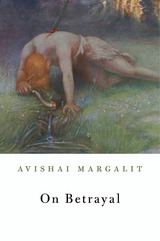
Adultery, treason, and apostasy no longer carry the weight they once did. Yet we constantly see and hear stories of betrayal, and many people have personally experienced a destructive breach of loyalty. Avishai Margalit argues that the tension between the ubiquity of betrayal and the loosening of its hold is a sign of the strain between ethics and morality, between thick and thin human relations. On Betrayal offers a philosophical account of thick human relations—relationships with friends, family, and core communities—through their pathology, betrayal.
Judgments of betrayal often shift unreliably. A whistle-blower to some is a backstabber to others; a traitor to one side is a hero to the other. Yet the notion of what it means to betray is remarkably consistent across cultures and eras. Betrayal undermines thick trust, dissolving the glue that holds our most meaningful relationships together. Recently, public attention has lingered on trust between strangers—on relations that play a central role in the globalized economy. These, according to Margalit, are guided by morality. On Betrayal is about ethics: what we owe to the people and groups that give us our sense of belonging.
Margalit’s clear-sighted account draws on literary, historical, and personal sources, including stories from his childhood during the 1948 Arab-Israeli War. Through its discussion of betrayal, it examines what our thick relationships are and should be and revives the long-discarded notion of fraternity.
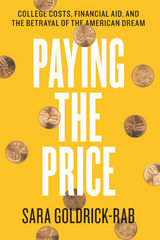
Not necessarily, says Sara Goldrick-Rab, and with Paying the Price, she shows in damning detail exactly why. Quite simply, college is far too expensive for many people today, and the confusing mix of federal, state, institutional, and private financial aid leaves countless students without the resources they need to pay for it.
Drawing on an unprecedented study of 3,000 young adults who entered public colleges and universities in Wisconsin in 2008 with the support of federal aid and Pell Grants, Goldrick-Rab reveals the devastating effect of these shortfalls. Half the students in the study left college without a degree, while less than 20 percent finished within five years. The cause of their problems, time and again, was lack of money. Unable to afford tuition, books, and living expenses, they worked too many hours at outside jobs, dropped classes, took time off to save money, and even went without adequate food or housing. In many heartbreaking cases, they simply left school—not with a degree, but with crippling debt. Goldrick-Rab combines that shocking data with devastating stories of six individual students, whose struggles make clear the horrifying human and financial costs of our convoluted financial aid policies.
America can fix this problem. In the final section of the book, Goldrick-Rab offers a range of possible solutions, from technical improvements to the financial aid application process, to a bold, public sector–focused “first degree free” program. What’s not an option, this powerful book shows, is doing nothing, and continuing to crush the college dreams of a generation of young people.
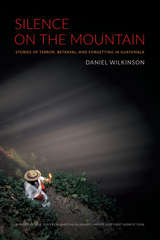
Silence on the Mountain is a virtuoso work of reporting and a masterfully plotted narrative tracing the history of Guatemala’s thirty-six-year internal war, a conflict that claimed the lives of some 200,000 people, the vast majority of whom died (or were “disappeared”) at the hands of the U.S.-backed military government. Written by Daniel Wilkinson, a young human rights worker, the story begins in 1993, when the author decides to investigate the arson of a coffee plantation’s manor house by a band of guerrillas. The questions surrounding this incident soon broaden into a complex mystery whose solution requires Wilkinson to dig up the largely unwritten history of the country’s recent civil war, following its roots back to a land reform movement that was derailed by a U.S.-sponsored military coup in 1954 and to the origins of a plantation system that put Guatemala’s Mayan Indians to work picking coffee beans for the American and European markets.
Decades of terror-inspired fear have led the Guatemalans to adopt a survival strategy of silence so complete that it verges on collective amnesia. The author’s great triumph is that he finds a way for people to tell their stories, and it is through these stories—dramatic, intimate, heartbreaking—that we are shown the anatomy of a thwarted revolution that has relevance not only to Guatemala but also to countless places around the world where terror has been used as a political tool.
READERS
Browse our collection.
PUBLISHERS
See BiblioVault's publisher services.
STUDENT SERVICES
Files for college accessibility offices.
UChicago Accessibility Resources
home | accessibility | search | about | contact us
BiblioVault ® 2001 - 2024
The University of Chicago Press


